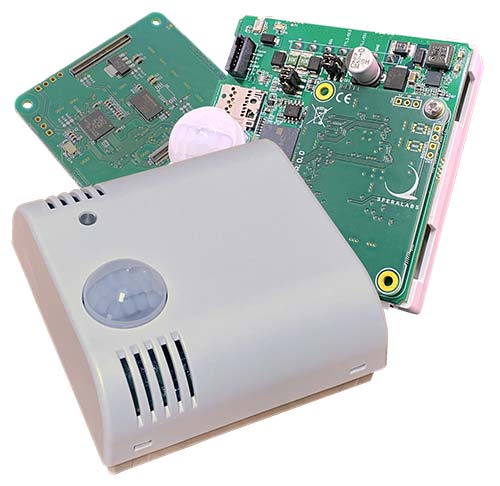 Sfera Labs has extended its widely-deployed family of Exo Sense Raspberry Pi-based technologies with the launch of Exo Sense RP, a small form factor, low-power edge-computing multi-sensor module built around the Raspberry Pi RP2040 microcontroller unit (MCU).
Sfera Labs has extended its widely-deployed family of Exo Sense Raspberry Pi-based technologies with the launch of Exo Sense RP, a small form factor, low-power edge-computing multi-sensor module built around the Raspberry Pi RP2040 microcontroller unit (MCU).
Ideal for installation in space-constrained, indoor environments, the Exo Sense RP module combines the performance and versatility of the RP2040 MCU with an extensive array of sensors in a wall-mount enclosure measuring just 80mm x 80mm. As well as operating as a stand-alone edge-computing multi-sensor module, a series of RP modules can be deployed as complementary satellite units for complex Exo Sense networks.
As standard the Exo Sense RP integrates temperature, humidity, air quality (VOC), light and motion sensors, a microphone for noise detection and advanced audio processing. Additional, peripheral and custom sensors can be connected through communication interfaces to extend the sensing capabilities in areas such as CO2 monitoring, seismic monitoring (earthquake detection) and vibration measurement.
The new module incorporates general purpose I/Os (GPIOs) to monitor external signals and control actuators while an RS-485 and other digital interfaces can be used for system integration and communication with other devices, such as Wiegand keypads and card readers. Alerts and status signals can be implemented via an embedded LED indicator and piezoelectric buzzer.
Fully CE- and FCC-compliant, Sfera Labs’ Exo Sense RP is suitable for a wide variety of residential and commercial implementations including home/building automation, environmental monitoring, people counting, room management, alarm reporting and access control.
The RP2040 is the first high-performance MCU designed by Raspberry Pi and has gained a significant global user base since it was launched in 2021. Combining a dual-core Arm Cortex-M0+ processor, clocked at up to 133MHz, with 264kB of internal RAM and 16MB of on-board Flash, the processor features a highly flexible input/output internal architecture and includes several standard interfaces.
Having a standard Raspberry Pi RP2040 as its processing unit, the Exo Sense RP can be programmed in C/C++ and MicroPython and is supported by several IDEs, including Visual Studio Code and the Arduino IDE. All coding resources, tools, examples and the vast community support available for the RP2040, as well as the open-source libraries and applications developed by Sfera Labs specifically for Exo Sense RP, can be leveraged to easily develop professional solutions.
The Exo Sense RP can be supplied with custom branding options to support OEM requirements.
For more information on Exo Sense RP visit: https://www.sferalabs.cc/product/exo-sense-rp/
Exo Sense RP Technical Specifications
- Raspberry Pi RP2040, dual-core Arm Cortex M0+ processor clocked up to 133MHz, along with 264kB of SRAM
- 16MB on-board Flash memory
- 16kbit SRAM with EEPROM backup
- 10-28Vdc power supply, with surge and reverse polarity protection, plus 1.1A resettable fuse
- Sensirion SHT40 temperature and humidity sensor
- Sensirion SGP40 air quality (VOC) sensor
- Texas Instruments OPT3001 digital ambient light sensor (ALS) with high-precision human-eye response
- Panasonic EKMC PIR motion sensor
- TDK ICS-43432 digital I²S interface microphone for audio recording and environment noise detection
- Two digital inputs for potential-free contacts or TTL level input/output with 1-Wire, I²C and Wiegand compatibility
- One open collector output with a maximum output current of 100mA, protected against over-current and short circuits
- Standard RS-485 interface to the RP2040 UART serial pins, with electrostatic discharge (ESD) protection
- Real time clock with replaceable CR1025 Lithium / Manganese Dioxide back-up battery
- Microchip ATECC608 secure element chip
- GPIO/PWM-controlled piezoelectric buzzer, for acoustic feedback
- GPIO-controlled LED
- Hidden micro-USB port with Micro-AB receptacle (for programming and debugging the RP2040 MCU), can be accessed by opening the case
- Hidden microSD slot for data storage
- Optional earthquake sensor module
- 80mm x 80mm wall-mount ABS case with fast snap-in terminal block for easier installation


